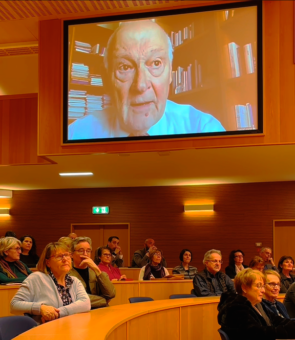
Communion in Action Report: communicating achievements so that good can circulate
On February 20, 2024, the presentation of the Focolare Movement’s ” Communion in Action Report,” an overview of the activities and initiatives promoted around the world in the year 2022, was held in Rome. Central theme: dialogue. 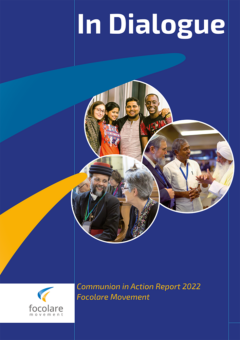 “By continually living the ‘spirituality of unity’ or ‘of communion,’ I can effectively contribute to making my Church ‘a home and a school of communion’; to advancing, with the faithful of other Churches or Ecclesial Communities, the unity of the Church; by making, with people of other religions and cultures, ever wider spaces of universal fraternity.”[1] With these words, Chiara Lubich, founder of the Focolare Movement, reflected on the importance of acting every day as “apostles of dialogue,” thus generating new forms of relating to the other, listening and welcoming the reality of others in their specific character. A dimension to which each of us seems to be called and which is capable of becoming concrete and living experience, not only to be able to “quantify” in numerical terms, but which, in order to bear fruit, must be put in common. This is the focus of the Focolare Movement’s second “Communion in Action Report,” the mission statement presented on
“By continually living the ‘spirituality of unity’ or ‘of communion,’ I can effectively contribute to making my Church ‘a home and a school of communion’; to advancing, with the faithful of other Churches or Ecclesial Communities, the unity of the Church; by making, with people of other religions and cultures, ever wider spaces of universal fraternity.”[1] With these words, Chiara Lubich, founder of the Focolare Movement, reflected on the importance of acting every day as “apostles of dialogue,” thus generating new forms of relating to the other, listening and welcoming the reality of others in their specific character. A dimension to which each of us seems to be called and which is capable of becoming concrete and living experience, not only to be able to “quantify” in numerical terms, but which, in order to bear fruit, must be put in common. This is the focus of the Focolare Movement’s second “Communion in Action Report,” the mission statement presented on 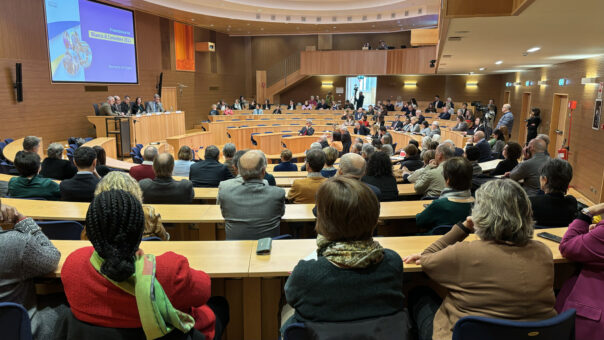 the 20th of February 2024 at the General Curia of the Society of Jesus in Rome. The document, translated into five languages (Italian, English, French, Spanish and Portuguese), is an overview of the activities and initiatives promoted by the Focolare in the year 2022, a narrative not only of the spontaneous sharing of goods, but of experiences and initiatives lived worldwide, which are inspired by and for the dialogues, and which are being specifically illustrated in this publication: the dialogue between Ecclesial Movements and New Communities in the Catholic Church; the one between the various Christian Churches; the dialogue between different religions, with different cultures, with Institutions, and in engagement with the many global challenges. Among the speakers at the presentation press conference, in the presence of Margaret Karram and Jesús Morán, President and Co-President of the Focolare Movement, were Monsignor Juan Fernando Usma Gómez, Head of the Western Section of the Dicastery for the Promotion of Christian Unity, Dr. Giuseppe Notarstefano, National President of Italian Catholic Action, Dr. Rita Moussallem, head of the Focolare’s Center for Interreligious Dialogue, and Giancarlo Crisanti, Focolare’s general administrator. Participating via internet were Monsignor Athenagoras Fasiolo, Bishop of Terme and auxiliary of the Holy Orthodox Archdiocese of Italy, and Prof. Stefano Zamagni, economist and professor of Political Economy at the University of Bologna. The session, which was moderated by journalist Alessandro de Carolis, was a true exchange of reflections and emphasized how terms such as budget and communion which seem to be poles apart, accounting not only for numbers but also for life.
the 20th of February 2024 at the General Curia of the Society of Jesus in Rome. The document, translated into five languages (Italian, English, French, Spanish and Portuguese), is an overview of the activities and initiatives promoted by the Focolare in the year 2022, a narrative not only of the spontaneous sharing of goods, but of experiences and initiatives lived worldwide, which are inspired by and for the dialogues, and which are being specifically illustrated in this publication: the dialogue between Ecclesial Movements and New Communities in the Catholic Church; the one between the various Christian Churches; the dialogue between different religions, with different cultures, with Institutions, and in engagement with the many global challenges. Among the speakers at the presentation press conference, in the presence of Margaret Karram and Jesús Morán, President and Co-President of the Focolare Movement, were Monsignor Juan Fernando Usma Gómez, Head of the Western Section of the Dicastery for the Promotion of Christian Unity, Dr. Giuseppe Notarstefano, National President of Italian Catholic Action, Dr. Rita Moussallem, head of the Focolare’s Center for Interreligious Dialogue, and Giancarlo Crisanti, Focolare’s general administrator. Participating via internet were Monsignor Athenagoras Fasiolo, Bishop of Terme and auxiliary of the Holy Orthodox Archdiocese of Italy, and Prof. Stefano Zamagni, economist and professor of Political Economy at the University of Bologna. The session, which was moderated by journalist Alessandro de Carolis, was a true exchange of reflections and emphasized how terms such as budget and communion which seem to be poles apart, accounting not only for numbers but also for life. 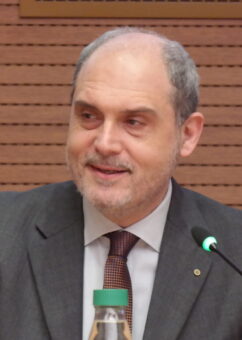 “The social budget has been a great opportunity for us,” said Dr. Notarstefano, national president of Catholic Action, among the first ecclesial realities to draw up a mission statement, “and has encouraged us in this urgent pastoral conversion to which we are called by the Pope. It was also a way to begin to reflect on how to communicate this associative life better, (…) to look at ourselves, with transparency, to give an account to the outside, but to communicate it better, to put it in common.”.
“The social budget has been a great opportunity for us,” said Dr. Notarstefano, national president of Catholic Action, among the first ecclesial realities to draw up a mission statement, “and has encouraged us in this urgent pastoral conversion to which we are called by the Pope. It was also a way to begin to reflect on how to communicate this associative life better, (…) to look at ourselves, with transparency, to give an account to the outside, but to communicate it better, to put it in common.”. 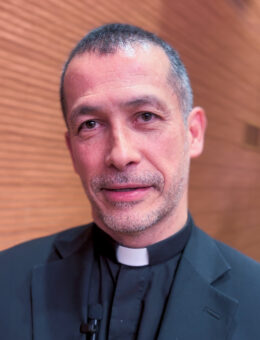 According to Msgr. Usma Gómez, in light of the current scenario that seems increasingly fragmented, in talking about the path of unity among the Churches, taking stock as Christians “means looking at God’s plans, our plans, and the plans of the world. (…) God’s plans would be to preserve the unity of the spirit by the bond of peace,” he continued, “but we see that in the world, war is the plan that is taking hold. It is possible to develop communion in differences, (…) but this reconciled diversity calls us to make peace, the heart of Ecumenism is the heart of peace.”.
According to Msgr. Usma Gómez, in light of the current scenario that seems increasingly fragmented, in talking about the path of unity among the Churches, taking stock as Christians “means looking at God’s plans, our plans, and the plans of the world. (…) God’s plans would be to preserve the unity of the spirit by the bond of peace,” he continued, “but we see that in the world, war is the plan that is taking hold. It is possible to develop communion in differences, (…) but this reconciled diversity calls us to make peace, the heart of Ecumenism is the heart of peace.”. 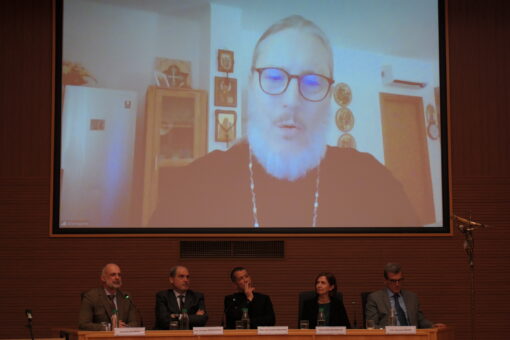 An encouragement, then, to promote paths of fraternity in a network, in a synodal style and specifically, in light of the chosen theme, to do so through a “method” that can bring closer especially those who are mostly unbelievers. “Taking stock of the communion of a Movement that is so open, so able to bring others to understand that dialogue does not take away, but adds, enriches, is very important,” , said Monsignor Athenagoras Fasiolo bishop of Terme and auxiliary of the Holy Orthodox Archdiocese of Italy, who, in addition to emphasizing the Focolare’s great commitment to the path of unity among the various Churches, reflected on the prophetic role that different faiths can play in the world, without falling into the trap of ideologies: “if as faiths we manage to be prophecy then we manage to awaken what is best in the human heart.”.
An encouragement, then, to promote paths of fraternity in a network, in a synodal style and specifically, in light of the chosen theme, to do so through a “method” that can bring closer especially those who are mostly unbelievers. “Taking stock of the communion of a Movement that is so open, so able to bring others to understand that dialogue does not take away, but adds, enriches, is very important,” , said Monsignor Athenagoras Fasiolo bishop of Terme and auxiliary of the Holy Orthodox Archdiocese of Italy, who, in addition to emphasizing the Focolare’s great commitment to the path of unity among the various Churches, reflected on the prophetic role that different faiths can play in the world, without falling into the trap of ideologies: “if as faiths we manage to be prophecy then we manage to awaken what is best in the human heart.”. 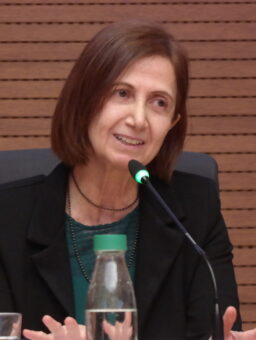 And it is precisely “life and prophecy” that are the two tracks on which the Focolare Movement has proceeded in these 80 years of history also on the path of interreligious dialogue, as Dr. Rita Mussallem stated in the hall; a path that has led the reality founded by Lubich, to come into contact, in so many countries, with people of various religions, creating in the appreciation of diversity and reciprocity, a common ground where they can relate with the spirituality of unity, get to know each other and “give,” said Moussalem, “the willingness to learn from each other, the sharing of sorrows, challenges, hopes and also the shared commitment to work for peace, for good, for fraternity. In a world torn apart by polarizations where religions are too often instrumentalized, in talking about the concept of peace, “authentic dialogue,” she continued, “is a very helpful remedy (…) because it makes you discover and see the humanity of the other, it disarms you.
And it is precisely “life and prophecy” that are the two tracks on which the Focolare Movement has proceeded in these 80 years of history also on the path of interreligious dialogue, as Dr. Rita Mussallem stated in the hall; a path that has led the reality founded by Lubich, to come into contact, in so many countries, with people of various religions, creating in the appreciation of diversity and reciprocity, a common ground where they can relate with the spirituality of unity, get to know each other and “give,” said Moussalem, “the willingness to learn from each other, the sharing of sorrows, challenges, hopes and also the shared commitment to work for peace, for good, for fraternity. In a world torn apart by polarizations where religions are too often instrumentalized, in talking about the concept of peace, “authentic dialogue,” she continued, “is a very helpful remedy (…) because it makes you discover and see the humanity of the other, it disarms you. 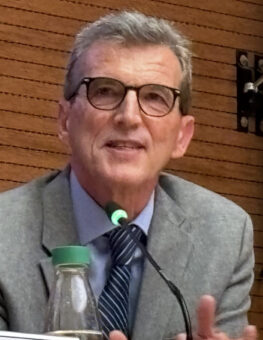 The “person” is thus the beating heart of a circular path that has given rise, over time, to the many activities to which this text bears witness. “When we speak of a ‘budget,'” said Giancarlo Crisanti, “one expects a lot of numbers, but in the Communion in Action Report ‘ there is much more narrative and the the numbers don’t include the people who make these activities possible .” “The Budget,” said Crisanti, “highlights how this communion of goods is able to realize initiatives, projects, works that go in the direction of dialogue (…), that help the world to dialogue a little more.”.
The “person” is thus the beating heart of a circular path that has given rise, over time, to the many activities to which this text bears witness. “When we speak of a ‘budget,'” said Giancarlo Crisanti, “one expects a lot of numbers, but in the Communion in Action Report ‘ there is much more narrative and the the numbers don’t include the people who make these activities possible .” “The Budget,” said Crisanti, “highlights how this communion of goods is able to realize initiatives, projects, works that go in the direction of dialogue (…), that help the world to dialogue a little more.”.  Referring to the intuition of the Economy of Communion, Professor Stefano Zamagni stated that it is also “a method for attacking the root causes of war situations” and, insisting on the ‘application, to the concept of justice, of the concept of equity, he affirmed how it is evident that the publication of this “Communion in Action” today, cannot be only a way of accounting, but the opportunity to be grasped in order to be truly “apostles,” messengers of good news. In this time “evil attracts more than good, whereas the beautiful attracts more than the ugly, and knowledge attracts more than ignorance,” asserted Zamagni, inviting each one to “to say what is good and say it well”: “we must make sure that we make known, obviously with humility, the gratuitousness with which good is done. (…) this notion of a Communion in Action Report,’ means that one tells what has been done, but with a view to the future”.
Referring to the intuition of the Economy of Communion, Professor Stefano Zamagni stated that it is also “a method for attacking the root causes of war situations” and, insisting on the ‘application, to the concept of justice, of the concept of equity, he affirmed how it is evident that the publication of this “Communion in Action” today, cannot be only a way of accounting, but the opportunity to be grasped in order to be truly “apostles,” messengers of good news. In this time “evil attracts more than good, whereas the beautiful attracts more than the ugly, and knowledge attracts more than ignorance,” asserted Zamagni, inviting each one to “to say what is good and say it well”: “we must make sure that we make known, obviously with humility, the gratuitousness with which good is done. (…) this notion of a Communion in Action Report,’ means that one tells what has been done, but with a view to the future”.
Maria Grazia Berretta
Communion in Action Report in pdf Presentation – Communion in Action Report 2022- Video in italian https://www.youtube.com/watch?v=3jizpECFoss [1] Chiara Lubich, ‘’Apostles of Dialogue’, Castel Gandolfo (Italy), 22.1.2004 in World Conference Call.
